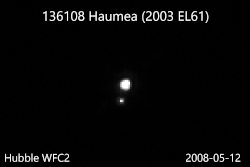Moons of Haumea
The dwarf planet Haumea has two known moons, Hiʻiaka and Namaka. They are named after the daughters of the Hawaiian goddess of fertility and childbirth, Haumea.[1] Hiʻiaka was the goddess of dance, and Namaka was the goddess of water and the sea.[1] The two moons were discovered in 2005 by the telescopes at the W. M. Keck Observatory in Hawaii.
The moons were formed billions of years ago after something crashed into Haumea and broke apart its layer of ice. Hiʻiaka, which is about 350 km (220 mi) in diameter,[2] is the larger of the two moons, and it is farther away from the planet. It has large amounts of ice on its surface. Namaka, which is only one-tenth the size, has a strange orbit, affected by the larger moon.[3]
Hiʻiaka was discovered on 26 January, 2005,[4] and was first nicknamed "Rudolph the Red Nosed Reindeer".[5] Namaka was discovered on 30 June, 2005, and was given the nickname "Blitzen the Reindeer."[3] They were given their official names by the International Astronomical Union on 17 September, 2008.[6]
Moons Of Haumea Media
Animation of Haumea and its moons, imaged by Hubble in 2008. Hiʻiaka is the brighter object around Haumea (center), and Namaka is the dimmer object below.
References
- ↑ 1.0 1.1 Robert D. Craig (2004). Handbook of Polynesian Mythology. ABC-CLIO. p. 128. ISBN 1576078949.
- ↑
M. E. Brown, M. A. van Dam, A. H. Bouchez; et al. (2005-10-02). "Satellites of the largest Kuiper belt objects" (PDF). The Astrophysical Journal. 639 (1): 43–46. arXiv:astro-ph/0510029. Bibcode:2006ApJ...639L..43B. doi:10.1086/501524. S2CID 2578831. Retrieved 2009-09-29.
{{cite journal}}: CS1 maint: multiple names: authors list (link) - ↑ 3.0 3.1
D. Ragozzine, M. E. Brown, C. A. Trujillo, E. L. Schaller. "Orbits and Masses of the 2003 EL61 Satellite System". AAS DPS conference 2008. Retrieved 2008-10-17.
{{cite web}}: CS1 maint: multiple names: authors list (link) - ↑
Michael E. Brown, A. H. Bouchez, D. Rabinowitz. R. Sari, C. A. Trujillo, M. van Dam, R. Campbell, J. Chin, S. Hardman, E. Johansson, R. Lafon, D. Le Mignant, P. Stomski, D. Summers, and P. Wizinowich (2005-09-02). "Keck Observatory Laser Guide Star Adaptive Optics Discovery and Characterization of a Satellite to the Large Kuiper Belt Object 2003 EL61". The Astrophysical Journal Letters. 632 (1): L45–L48. Bibcode:2005ApJ...632L..45B. doi:10.1086/497641. S2CID 119408563.
{{cite journal}}: CS1 maint: multiple names: authors list (link) - ↑ Kenneth Chang (2007-03-20). "Piecing Together the Clues of an Old Collision, Iceball by Iceball". New York Times. https://www.nytimes.com/2007/03/20/science/space/20kuip.html. Retrieved 2008-10-12.
- ↑ "News Release - IAU0807: IAU names fifth dwarf planet Haumea". International Astronomical Union. 2008-09-17. Archived from the original on 2012-04-13. Retrieved 2008-09-18.


